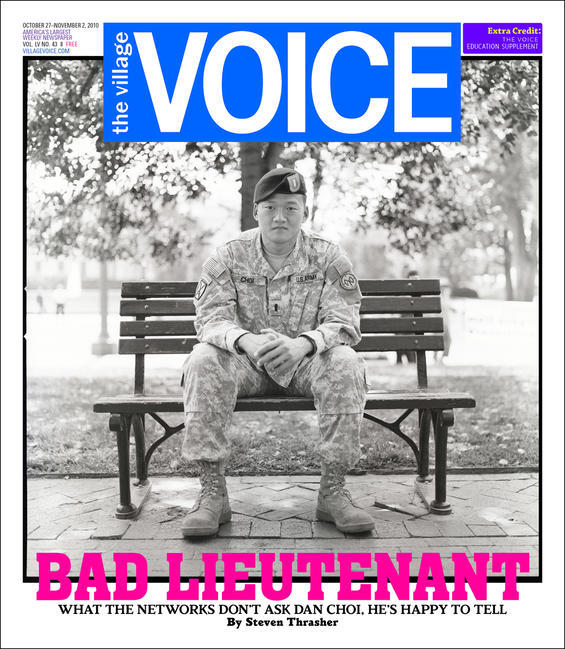As you can see above, The Village Voice’s cover story this week is about Lt. Dan Choi. It’s a really interesting piece, and not just because it talks in detail about Choi’s use of the Grindr iPhone application. The story deserves a read in its entirety, but we wanted to point you to one particular section in which Choi responds to recent criticism on DallasVoice.com from Texas Tech activist Nonnie Ouch. We’ve put in a message to Ouch to get her response to Choi’s response, but we haven’t heard back, so for now here’s the excerpt from the VV story:
Others have criticized Choi for supposedly charging too much for speaking engagements.
“I’ve lost all respect for you as a gay- and human-rights activist,” Nonnie Ouch, president of the Gay-Straight Alliance at Texas Tech University, wrote in an open letter to Choi in August. Ouch, bemoaning “the exorbitant amount of $10,000 to get you out here,” wrote that “after nine months of dealing with your agent, I received an e-mail directly from you. In short, you basically said that the only way I could get you to speak is if I raised enough money to bring you to Tech. No deals, no compromises, end of story.”
Ouch had first seen Choi at the National Equality March in October 2009, where she was inspired by his “Love Is Worth It!” speech. It broke her heart, she wrote, to tell him, “You, sir, have lost sight in one of those many $10,000 checks written to you, of why you came out and became an activist in the first place.”
Asked about it, Choi calls it “a strange situation” but is dismissive of Ouch’s description of Texas Tech students who wanted to hear him as “poor college kids in an extremely conservative city.” The poorest kids, Choi argues, “are not going to college.” He says he’s proud of the fact that he’s been taking care of himself “since I left high school,” by getting appointed to West Point and serving in the military. And he says that he donates a great deal of his fees to homeless LGBT youth of color, “who are really the poorest and the most marginalized.”
Besides, students can get funds, he maintains, through their student activity boards and other sources to pay his appearance fees. He says he thinks the dispute “wasn’t about money.” He has a rider in his speaking contract that stipulates he won’t come to a school unless all campus groups are invited—gay, military, Christian—and that “they must invite the most homophobic group, four times, in writing.”
When the Texas Tech kids wouldn’t play ball by his rules, he says, “I didn’t have time for it.”
Money is a touchy subject for Choi, who says that, regardless of the amount he charges, “there are those who even question, ‘Who are you to charge anything?’ ” It’s no one’s business, he says, but “those plane tickets don’t buy themselves.” Over the past couple of years, he has gone from earning $62,000 a year down to about $700 a month (from a monthly disability check for his Iraq service, which has left him 50 percent disabled with a lung condition that, he says, won’t prevent him from re-enlisting).














